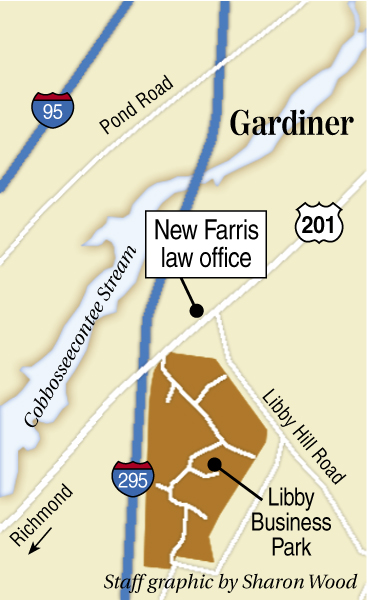GARDINER — A local attorney is scaling back his plans for a proposed business park on Brunswick Avenue after he and the city couldn’t reach an agreement on the details of a tax break for the project.
Gregory Farris of Farris Law proposed building an office business park on 27 acres on Brunswick Avenue across the street from Libby Hill Road, but requested a tax break significantly larger than the city usually grants.
Farris is instead constructing an office building for his law firm, which has two offices in downtown Gardiner and another in Freeport. He said the two downtown offices will move to the 5,000-square-foot building being constructed on Brunswick Avenue, which is U.S. Route 201, when it’s finished next spring. His Freeport office will likely stay open.
City staff recommended at a Gardiner City Council meeting that the city create a tax-increment financing district for the 27-acre property between Brunswick Avenue and Interstate 295 and give back 33 percent of the taxes from the value of new development for 10 years.
Farris said he and his business partner, Kevin Franchetti, would need a tax break, or credit enhancement, of 100 percent for the first five years — meaning they would get back all of the property taxes from new development — and 50 percent for the next 15 years.
Tax-increment financing, or TIFs, allow municipalities to freeze the value of properties on the tax rolls and use the tax revenues that would have been earned from future development for set uses, including giving it back to the developer in the form of credit enhancements or economic development activities. Taxes from the prior valuation on the property would still be paid to the city’s general fund.
The value from the new development is also sheltered from the state for the duration of the TIF, decreasing the percent the city has to pay for its share of county and school district costs, and increasing the amount of municipal revenue sharing and education aid from the state.
Farris said his offer made sense for Gardiner because it wouldn’t have cost the city anything.
City officials saw it differently and said granting such a large tax break would have been a departure from the city’s past practice.
The five credit enhancement agreements between the city and private companies range from 25 percent of future taxes to 50 percent, and all but one are only for 10 years, according to City Manager Scott Morelli.
“At the end of the day, you have to be able to justify to the public the percent of the tax break you’re going to give,” Morelli said. “That’s where we were unable to reach an agreement, but it was a respectful negotiation. Certainly both sides did try.”
Nate Rudy, director of economic and community development for the city, said he and other city officials met with Farris and Franchetti after the Aug. 21 council meeting to try to reach an agreement on figures. The last meeting was on Sept. 11, he said.
“The door remains open, but after a few months of talking about it, we couldn’t get middle ground between where he wanted to be and what the city could offer him. It’s really unfortunate,” Rudy said.
Farris’ original proposal called for the construction of a 7,000-square-foot building for office suites and cost around $1 million, he said. He still needs to bring sewage and utilities to the single office building being constructed, but he said the infrastructure needed has been scaled back.
Farris said he could pursue a similar plan in the future in Gardiner or another community if he finds enough private interest.
His offices in downtown Gardiner, at 218 and 251 Water St., will be left vacant by the move, but he said he doesn’t expect to have trouble finding tenants.
Paul Koenig — 621-5663
pkoenig@centralmaine.com
Send questions/comments to the editors.


